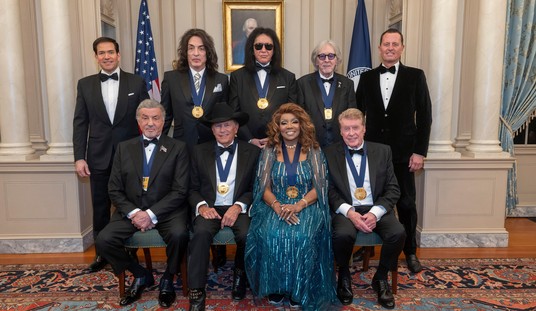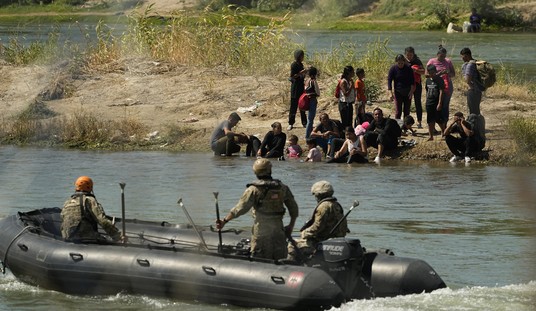
Yesterday, the annual Congress of Interpol administered a resounding and unexpected swat across the snout of Vladimir Putin. Ever since the former chief of Interpol, the ChiCom Meng Hongwei, literally disappeared after being taken into custody by Chinese authorities on September 25 (count the number of WaPo editorials demanding answers for his disappearance versus those chumming the water on behalf of Islamist and Muslim Brotherhood agitator Jamal Khashoggi), Interpol has been without a director. In a chutzpah-infused move that few other than Vladimir Putin could pull off, Russia put forward a Putin crony, Alexander Prokopchuk, who is one of Interpol’s vice presidents, as a candidate for director. His election seemed to be a foregone conclusion even after the White House, ever the slave of Putin, weighed in opposing Prokopchuk:
The White House says the U.S. is opposing the Russian nominee to lead the international police organization Interpol, citing Russian “abuses.”
National Security Council spokesman Garrett Marquis says the U.S. “strongly endorses” Interpol’s current interim president, South Korea’s Kim Jong Yang, to hold the post permanently. He is running against Interpol vice president Alexander Prokopchuk, a general in the Russian Interior Ministry.
Marquis is outlining the U.S. opposition to Prokopchuk in a Tuesday tweet, saying “the Russian government abuses INTERPOL’s processes to harass its political opponents.”
Prominent Kremlin critics have raised alarm that the Russian official is close to President Vladimir Putin, and have pointed to Russian attempts to use Interpol to pursue opponents of Putin’s government.
Interpol’s general assembly is expected to elect its new president on Wednesday in Dubai.
In fact, even as the Interpol Congress was gathering, it was predicted that Russia would win the vote.
Interpol is due to elect a new president at a general assembly in Dubai on Wednesday. Alexander Prokopchuk, a former Russian interior ministry major general who has served as Interpol’s vice president since 2016, is widely expected to win the poll.
In the end, though, the opposition of the White House was able to solidify a winning coaltion around senior vice president, South Korea’s Kim Jong-yang.
Interpol has elected South Korean Kim Jong-yang as its president, rejecting the controversial Russian frontrunner.
Mr Kim was chosen by Interpol’s 194 member states at a meeting of its annual congress in Dubai.
He beat Russia’s Alexander Prokopchuk, who has been accused of using Interpol’s arrest warrant system to target critics of the Kremlin.
Russia blamed the outcome of the voting on “unprecedented pressure and interference”.
…
Mr Kim, 57, beat Mr Prokopchuk, also 57, by 101 votes to 61 at Interpol’s General Assembly meeting on Wednesday, media reports say.
South Korean named Interpol president in blow to Russia. https://t.co/kj1YY8X0LJ
— The Associated Press (@AP) November 21, 2018
This was a victory for Interpol and the international law enforcement community as well as for the White House. A Putin crony with a history of using Interpol arrest warrants, aka “red notices,” to harass Putin’s critics at the head of the organization could have dealt its credibility a death blow.
#Russia's state TV hosts and panelists excitedly discuss the possibility that the Russian candidate, Major General Aleksandr Prokopchuk, may be elected as the head of @INTERPOL_HQ .
TV host Olga Skabeeva says: "We'll put the entire government of #Ukraine in prison."#Interpol ©️ pic.twitter.com/uHIBjkjYFu— Julia Davis (@JuliaDavisNews) November 20, 2018
BREAKING: Lithuanian Parliament votes 88-0 to immediately consider withdrawing from Interpol, along with other democratic countries, if Russian candidate Prokopchuk is elected as head of Interpol https://t.co/udPNleQwWh
— Bill Browder (@Billbrowder) November 20, 2018
Rich.
In the article, TASS asks if Prokopchuk will become the next president and answers: "Probably, yes.", citing Western media reposts, citing the British government, claiming Russia secured a majority for Prokopchuk.
Another lie in it: Only "Kiev and Washington" oppose him. pic.twitter.com/am3shqbWc6— Julian Röpcke (@JulianRoepcke) November 20, 2018
It is also a valuable lesson in the real limits of Russia’s ability to influence action away from its immediate frontier and an object lesson in how Putin’s reach frequently exceeds his grasp. The final vote was not even close and it demonstrates that when the White House chooses to get out in front on an issue that it has the ability to carry the day.














Join the conversation as a VIP Member